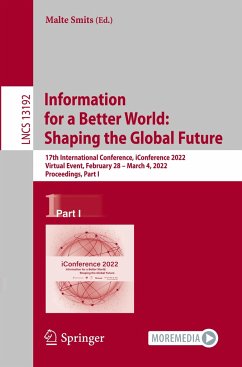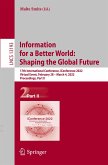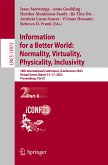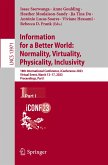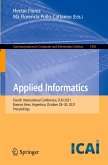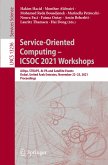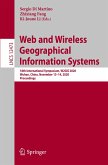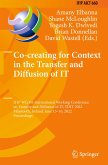Information for a Better World: Shaping the Global Future
17th International Conference, iConference 2022, Virtual Event, February 28 - March 4, 2022, Proceedings, Part I
Herausgegeben:Smits, Malte
Information for a Better World: Shaping the Global Future
17th International Conference, iConference 2022, Virtual Event, February 28 - March 4, 2022, Proceedings, Part I
Herausgegeben:Smits, Malte
- Broschiertes Buch
- Merkliste
- Auf die Merkliste
- Bewerten Bewerten
- Teilen
- Produkt teilen
- Produkterinnerung
- Produkterinnerung
This two-volume set LNCS 13192 - 13193 constitutes the refereed proceedings of the 17th International Conference on Information for a Better World: Shaping the Global Future, held in February 2022. Due to COVID-19 pandemic the conference was held virtually. The 32 full papers and the 29 short papers presented in this volume were carefully reviewed and selected from 167 submissions. They cover topics such as: Library and Information Science; Information Governance and Ethics; Data Science; Human-Computer Interaction and Technology¸ Information Behaviour and Retrieval¸ Communities and Media¸ Health Informatics.…mehr
Andere Kunden interessierten sich auch für
![Information for a Better World: Shaping the Global Future Information for a Better World: Shaping the Global Future]() Information for a Better World: Shaping the Global Future80,24 €
Information for a Better World: Shaping the Global Future80,24 €![Information for a Better World: Normality, Virtuality, Physicality, Inclusivity Information for a Better World: Normality, Virtuality, Physicality, Inclusivity]() Information for a Better World: Normality, Virtuality, Physicality, Inclusivity77,99 €
Information for a Better World: Normality, Virtuality, Physicality, Inclusivity77,99 €![Information for a Better World: Normality, Virtuality, Physicality, Inclusivity Information for a Better World: Normality, Virtuality, Physicality, Inclusivity]() Information for a Better World: Normality, Virtuality, Physicality, Inclusivity70,99 €
Information for a Better World: Normality, Virtuality, Physicality, Inclusivity70,99 €![Applied Informatics Applied Informatics]() Applied Informatics77,99 €
Applied Informatics77,99 €![Service-Oriented Computing - ICSOC 2021 Workshops Service-Oriented Computing - ICSOC 2021 Workshops]() Service-Oriented Computing - ICSOC 2021 Workshops58,99 €
Service-Oriented Computing - ICSOC 2021 Workshops58,99 €![Web and Wireless Geographical Information Systems Web and Wireless Geographical Information Systems]() Web and Wireless Geographical Information Systems39,99 €
Web and Wireless Geographical Information Systems39,99 €![Co-creating for Context in the Transfer and Diffusion of IT Co-creating for Context in the Transfer and Diffusion of IT]() Co-creating for Context in the Transfer and Diffusion of IT77,99 €
Co-creating for Context in the Transfer and Diffusion of IT77,99 €-
-
-
This two-volume set LNCS 13192 - 13193 constitutes the refereed proceedings of the 17th International Conference on Information for a Better World: Shaping the Global Future, held in February 2022. Due to COVID-19 pandemic the conference was held virtually.
The 32 full papers and the 29 short papers presented in this volume were carefully reviewed and selected from 167 submissions. They cover topics such as: Library and Information Science; Information Governance and Ethics; Data Science; Human-Computer Interaction and Technology¸ Information Behaviour and Retrieval¸ Communities and Media¸ Health Informatics.
The 32 full papers and the 29 short papers presented in this volume were carefully reviewed and selected from 167 submissions. They cover topics such as: Library and Information Science; Information Governance and Ethics; Data Science; Human-Computer Interaction and Technology¸ Information Behaviour and Retrieval¸ Communities and Media¸ Health Informatics.
Produktdetails
- Produktdetails
- Lecture Notes in Computer Science 13192
- Verlag: Springer / Springer International Publishing / Springer, Berlin
- Artikelnr. des Verlages: 978-3-030-96956-1
- 1st ed. 2022
- Seitenzahl: 504
- Erscheinungstermin: 23. Februar 2022
- Englisch
- Abmessung: 235mm x 155mm x 28mm
- Gewicht: 756g
- ISBN-13: 9783030969561
- ISBN-10: 3030969568
- Artikelnr.: 63322772
- Herstellerkennzeichnung Die Herstellerinformationen sind derzeit nicht verfügbar.
- Lecture Notes in Computer Science 13192
- Verlag: Springer / Springer International Publishing / Springer, Berlin
- Artikelnr. des Verlages: 978-3-030-96956-1
- 1st ed. 2022
- Seitenzahl: 504
- Erscheinungstermin: 23. Februar 2022
- Englisch
- Abmessung: 235mm x 155mm x 28mm
- Gewicht: 756g
- ISBN-13: 9783030969561
- ISBN-10: 3030969568
- Artikelnr.: 63322772
- Herstellerkennzeichnung Die Herstellerinformationen sind derzeit nicht verfügbar.
Bibliometric Analysis and Data Visualization of Archival Science Journal Literature (1971-2020) .-Analysis of the Dynamics among State Libraries, Local Libraries, and Citizens in the United States.- Controversial 'Black Legend' concept as misinformation or disinformation related to history: where do we go from here in 21st century information field?.- The Rural Information Penalty.- Predicting the usage of scientific datasets based on article, author, institution, and journal bibliometrics.- Library, Information Science, and Archives Doctoral Research trends in Australia.- Elapsed collective memory: Looking for the forgotten classic works in Library and Information Science.- Putting Community-Based Learning and Librarianship into Practice.- Information Governance & Ethics; Data Science; Human-Computer Interaction & Technology¸ Information Behaviour & Retrieval¸ Communities & Media¸ Health Informatics.- Online "helpful" lies: An empirical study of helpfulness in fake and authentic online reviews.- Setting up a Checkpoint for Research on the Prevalence of Journal Data Policies: A Systematic Review.- Internet access and bridging the digital divide: the crucial role of universal service obligations in telecom policy.- Toward a Practice-Based Approach to Privacy Literacy.- Good governance and national information transparency: A comparative study of
117 countries.- Involve humans in algorithmic fairness issue: A systematic review.- Tensions between intellectual property law and freedom of expression:
a UK perspective.- An Annotation Schema for the Detection of Social Bias in Legal Text Corpora.- Selling Political Data: How Political Ad Tech Firms' Discourses Legitimate Microtargeting.- Data Science; Human-Computer Interaction & Technology¸ Information Behaviour & Retrieval¸ Communities & Media¸ Health Informatics.- A Brief Typology of Time: Temporal Structuring and Dissonance in Service Provision for People Experiencing Homelessness.- Exploiting Transfer based Multitask Learning for the Detection of Media Bias in News Articles.- Data Analytics Usage, Absorptive Capacity and Sharing Economy Innovation Performance.- Cross-Regional Analysis of the Aging Phenomenon of Biomedical Scholars.- Practicing what is preached: Exploring reproducibility compliance of papers on reproducable research.- A Higher Purpose: Towards a Social Justice Informatics Research Framework.- XCoref: Cross-document Coreference Resolution in the Wild.- Impartial Predictive Modeling and he Use of Proxy Variables.- Human-Computer Interaction & Technology¸ Information Behaviour & Retrieval¸ Communities & Media¸ Health Informatics.- Flexibility, Occupation and Gender: Insights from a Panel Study of Online Freelancers.- Causal Discovery and Knowledge Linkage in Scientific Literature: a case study in biomedicine.- Facial Recognition Interaction in a University Setting: Impression, Reaction, and Decision-making.- The need for transparent demographic group trade-offs in Credit Risk and Income Classification.- Data Capitalism, Microsoft's Planetary Computer, and the Biodiversity Informatics Community.- Planning and running a low-contact UX design workshop during the pandemic: Challenges and design implications.- Testing the Generalization of Neural Language Models for COVID-19 Misinformation Detection.- Identifying Machine-Paraphrased Plagiarism.- An Ensemble Framework for Dynamic Character Relationship Sentiment in Fiction.- The Origin and Value of Disagreement Among Data Labelers: A Case Study of Individual Differences in Hate Speech Annotation.- Folk Theories and User Strategies on Dating Apps - How users understand and manage their experience with algorithmic matchmaking.- ontextual Perceptions of Feminine-, Masculine- and Gender-Ambiguous-Sounding Conversational Agents.- An Initial Analysis of E-Procurement Search Behaviour.- Mobile Devices as Information Discovery Tools for Young Children - A Multi-Method Study on Children's and Parents' Perspectives.- Conversational Interaction with Historical Figures: What's it good for? .-Hybrid digital card sorting: new research technique or mere variant?.- Improving Community Detection Performance in Heterogenous Music Network by Learning Edge-type Usefulness Distribution.- Information literacy, transition, and risk in the COVID-19-environment.- Intentions to Seek Information about COVID-19 Vaccine among Young Adults: An Application of the Theory of Planned Behavior.- Exploring the Relationship Between Youth Information Behavior, Substance Use, and Substance Use Expectancies: A Pilot Story.- Access to Information Two Years After an ICT4D Project in Bangladesh: New Digital Skills and Traditional Practices.- Understanding and Predicting Characteristics of Test Collections in Information Retrieval.- Sentiment and Network Analysis of Twitter Reactions to the U.S. Birthright Citizenship Ban Debate.- Understanding Information and Communication Opportunities and Challenges for RuralWomen through the Sustainable Livelihood Framework.- Communities & Media¸ Health Informatics.- You Are What You Tweet: Profiling Users by Past Tweets to Improve Hate Speech Detection.- A Digital Bridge: Increasing Digital Access to Low-Income Job Seekers and the Role of Community Organizations.- Using Local Community to Ease Long Haul Uncertainty during the COVID-19 Pandemic.- Perceiving Libraries in a Making Context: Voices of Arts and Crafts Hobbyists.- Flames of Justice in a Virtual Garden: An Analysis of a Digital campaign on Twitter Surrounding the Death of an Indian Celebrity.- Health Informatics.- Advice Giving in Medical Research Literature.- Professional identity and perceived crisis severity as antecedents of healthcare professionals' responses to health misinformation on social media.- "She seems more human": Understanding Twitter users' credibility assessments of dementia-related information.- Hands-Free Electronic Documentation in Emergency Care Work through Smart Glasses.- Privacy Attitudes and COVID Symptom Tracking Apps: Understanding Active Boundary Management by Users.- YouTube As a Helpful and Dangerous Information Source for Deliberate Self-harming Behaviours.
117 countries.- Involve humans in algorithmic fairness issue: A systematic review.- Tensions between intellectual property law and freedom of expression:
a UK perspective.- An Annotation Schema for the Detection of Social Bias in Legal Text Corpora.- Selling Political Data: How Political Ad Tech Firms' Discourses Legitimate Microtargeting.- Data Science; Human-Computer Interaction & Technology¸ Information Behaviour & Retrieval¸ Communities & Media¸ Health Informatics.- A Brief Typology of Time: Temporal Structuring and Dissonance in Service Provision for People Experiencing Homelessness.- Exploiting Transfer based Multitask Learning for the Detection of Media Bias in News Articles.- Data Analytics Usage, Absorptive Capacity and Sharing Economy Innovation Performance.- Cross-Regional Analysis of the Aging Phenomenon of Biomedical Scholars.- Practicing what is preached: Exploring reproducibility compliance of papers on reproducable research.- A Higher Purpose: Towards a Social Justice Informatics Research Framework.- XCoref: Cross-document Coreference Resolution in the Wild.- Impartial Predictive Modeling and he Use of Proxy Variables.- Human-Computer Interaction & Technology¸ Information Behaviour & Retrieval¸ Communities & Media¸ Health Informatics.- Flexibility, Occupation and Gender: Insights from a Panel Study of Online Freelancers.- Causal Discovery and Knowledge Linkage in Scientific Literature: a case study in biomedicine.- Facial Recognition Interaction in a University Setting: Impression, Reaction, and Decision-making.- The need for transparent demographic group trade-offs in Credit Risk and Income Classification.- Data Capitalism, Microsoft's Planetary Computer, and the Biodiversity Informatics Community.- Planning and running a low-contact UX design workshop during the pandemic: Challenges and design implications.- Testing the Generalization of Neural Language Models for COVID-19 Misinformation Detection.- Identifying Machine-Paraphrased Plagiarism.- An Ensemble Framework for Dynamic Character Relationship Sentiment in Fiction.- The Origin and Value of Disagreement Among Data Labelers: A Case Study of Individual Differences in Hate Speech Annotation.- Folk Theories and User Strategies on Dating Apps - How users understand and manage their experience with algorithmic matchmaking.- ontextual Perceptions of Feminine-, Masculine- and Gender-Ambiguous-Sounding Conversational Agents.- An Initial Analysis of E-Procurement Search Behaviour.- Mobile Devices as Information Discovery Tools for Young Children - A Multi-Method Study on Children's and Parents' Perspectives.- Conversational Interaction with Historical Figures: What's it good for? .-Hybrid digital card sorting: new research technique or mere variant?.- Improving Community Detection Performance in Heterogenous Music Network by Learning Edge-type Usefulness Distribution.- Information literacy, transition, and risk in the COVID-19-environment.- Intentions to Seek Information about COVID-19 Vaccine among Young Adults: An Application of the Theory of Planned Behavior.- Exploring the Relationship Between Youth Information Behavior, Substance Use, and Substance Use Expectancies: A Pilot Story.- Access to Information Two Years After an ICT4D Project in Bangladesh: New Digital Skills and Traditional Practices.- Understanding and Predicting Characteristics of Test Collections in Information Retrieval.- Sentiment and Network Analysis of Twitter Reactions to the U.S. Birthright Citizenship Ban Debate.- Understanding Information and Communication Opportunities and Challenges for RuralWomen through the Sustainable Livelihood Framework.- Communities & Media¸ Health Informatics.- You Are What You Tweet: Profiling Users by Past Tweets to Improve Hate Speech Detection.- A Digital Bridge: Increasing Digital Access to Low-Income Job Seekers and the Role of Community Organizations.- Using Local Community to Ease Long Haul Uncertainty during the COVID-19 Pandemic.- Perceiving Libraries in a Making Context: Voices of Arts and Crafts Hobbyists.- Flames of Justice in a Virtual Garden: An Analysis of a Digital campaign on Twitter Surrounding the Death of an Indian Celebrity.- Health Informatics.- Advice Giving in Medical Research Literature.- Professional identity and perceived crisis severity as antecedents of healthcare professionals' responses to health misinformation on social media.- "She seems more human": Understanding Twitter users' credibility assessments of dementia-related information.- Hands-Free Electronic Documentation in Emergency Care Work through Smart Glasses.- Privacy Attitudes and COVID Symptom Tracking Apps: Understanding Active Boundary Management by Users.- YouTube As a Helpful and Dangerous Information Source for Deliberate Self-harming Behaviours.
Bibliometric Analysis and Data Visualization of Archival Science Journal Literature (1971-2020) .-Analysis of the Dynamics among State Libraries, Local Libraries, and Citizens in the United States.- Controversial 'Black Legend' concept as misinformation or disinformation related to history: where do we go from here in 21st century information field?.- The Rural Information Penalty.- Predicting the usage of scientific datasets based on article, author, institution, and journal bibliometrics.- Library, Information Science, and Archives Doctoral Research trends in Australia.- Elapsed collective memory: Looking for the forgotten classic works in Library and Information Science.- Putting Community-Based Learning and Librarianship into Practice.- Information Governance & Ethics; Data Science; Human-Computer Interaction & Technology¸ Information Behaviour & Retrieval¸ Communities & Media¸ Health Informatics.- Online "helpful" lies: An empirical study of helpfulness in fake and authentic online reviews.- Setting up a Checkpoint for Research on the Prevalence of Journal Data Policies: A Systematic Review.- Internet access and bridging the digital divide: the crucial role of universal service obligations in telecom policy.- Toward a Practice-Based Approach to Privacy Literacy.- Good governance and national information transparency: A comparative study of
117 countries.- Involve humans in algorithmic fairness issue: A systematic review.- Tensions between intellectual property law and freedom of expression:
a UK perspective.- An Annotation Schema for the Detection of Social Bias in Legal Text Corpora.- Selling Political Data: How Political Ad Tech Firms' Discourses Legitimate Microtargeting.- Data Science; Human-Computer Interaction & Technology¸ Information Behaviour & Retrieval¸ Communities & Media¸ Health Informatics.- A Brief Typology of Time: Temporal Structuring and Dissonance in Service Provision for People Experiencing Homelessness.- Exploiting Transfer based Multitask Learning for the Detection of Media Bias in News Articles.- Data Analytics Usage, Absorptive Capacity and Sharing Economy Innovation Performance.- Cross-Regional Analysis of the Aging Phenomenon of Biomedical Scholars.- Practicing what is preached: Exploring reproducibility compliance of papers on reproducable research.- A Higher Purpose: Towards a Social Justice Informatics Research Framework.- XCoref: Cross-document Coreference Resolution in the Wild.- Impartial Predictive Modeling and he Use of Proxy Variables.- Human-Computer Interaction & Technology¸ Information Behaviour & Retrieval¸ Communities & Media¸ Health Informatics.- Flexibility, Occupation and Gender: Insights from a Panel Study of Online Freelancers.- Causal Discovery and Knowledge Linkage in Scientific Literature: a case study in biomedicine.- Facial Recognition Interaction in a University Setting: Impression, Reaction, and Decision-making.- The need for transparent demographic group trade-offs in Credit Risk and Income Classification.- Data Capitalism, Microsoft's Planetary Computer, and the Biodiversity Informatics Community.- Planning and running a low-contact UX design workshop during the pandemic: Challenges and design implications.- Testing the Generalization of Neural Language Models for COVID-19 Misinformation Detection.- Identifying Machine-Paraphrased Plagiarism.- An Ensemble Framework for Dynamic Character Relationship Sentiment in Fiction.- The Origin and Value of Disagreement Among Data Labelers: A Case Study of Individual Differences in Hate Speech Annotation.- Folk Theories and User Strategies on Dating Apps - How users understand and manage their experience with algorithmic matchmaking.- ontextual Perceptions of Feminine-, Masculine- and Gender-Ambiguous-Sounding Conversational Agents.- An Initial Analysis of E-Procurement Search Behaviour.- Mobile Devices as Information Discovery Tools for Young Children - A Multi-Method Study on Children's and Parents' Perspectives.- Conversational Interaction with Historical Figures: What's it good for? .-Hybrid digital card sorting: new research technique or mere variant?.- Improving Community Detection Performance in Heterogenous Music Network by Learning Edge-type Usefulness Distribution.- Information literacy, transition, and risk in the COVID-19-environment.- Intentions to Seek Information about COVID-19 Vaccine among Young Adults: An Application of the Theory of Planned Behavior.- Exploring the Relationship Between Youth Information Behavior, Substance Use, and Substance Use Expectancies: A Pilot Story.- Access to Information Two Years After an ICT4D Project in Bangladesh: New Digital Skills and Traditional Practices.- Understanding and Predicting Characteristics of Test Collections in Information Retrieval.- Sentiment and Network Analysis of Twitter Reactions to the U.S. Birthright Citizenship Ban Debate.- Understanding Information and Communication Opportunities and Challenges for RuralWomen through the Sustainable Livelihood Framework.- Communities & Media¸ Health Informatics.- You Are What You Tweet: Profiling Users by Past Tweets to Improve Hate Speech Detection.- A Digital Bridge: Increasing Digital Access to Low-Income Job Seekers and the Role of Community Organizations.- Using Local Community to Ease Long Haul Uncertainty during the COVID-19 Pandemic.- Perceiving Libraries in a Making Context: Voices of Arts and Crafts Hobbyists.- Flames of Justice in a Virtual Garden: An Analysis of a Digital campaign on Twitter Surrounding the Death of an Indian Celebrity.- Health Informatics.- Advice Giving in Medical Research Literature.- Professional identity and perceived crisis severity as antecedents of healthcare professionals' responses to health misinformation on social media.- "She seems more human": Understanding Twitter users' credibility assessments of dementia-related information.- Hands-Free Electronic Documentation in Emergency Care Work through Smart Glasses.- Privacy Attitudes and COVID Symptom Tracking Apps: Understanding Active Boundary Management by Users.- YouTube As a Helpful and Dangerous Information Source for Deliberate Self-harming Behaviours.
117 countries.- Involve humans in algorithmic fairness issue: A systematic review.- Tensions between intellectual property law and freedom of expression:
a UK perspective.- An Annotation Schema for the Detection of Social Bias in Legal Text Corpora.- Selling Political Data: How Political Ad Tech Firms' Discourses Legitimate Microtargeting.- Data Science; Human-Computer Interaction & Technology¸ Information Behaviour & Retrieval¸ Communities & Media¸ Health Informatics.- A Brief Typology of Time: Temporal Structuring and Dissonance in Service Provision for People Experiencing Homelessness.- Exploiting Transfer based Multitask Learning for the Detection of Media Bias in News Articles.- Data Analytics Usage, Absorptive Capacity and Sharing Economy Innovation Performance.- Cross-Regional Analysis of the Aging Phenomenon of Biomedical Scholars.- Practicing what is preached: Exploring reproducibility compliance of papers on reproducable research.- A Higher Purpose: Towards a Social Justice Informatics Research Framework.- XCoref: Cross-document Coreference Resolution in the Wild.- Impartial Predictive Modeling and he Use of Proxy Variables.- Human-Computer Interaction & Technology¸ Information Behaviour & Retrieval¸ Communities & Media¸ Health Informatics.- Flexibility, Occupation and Gender: Insights from a Panel Study of Online Freelancers.- Causal Discovery and Knowledge Linkage in Scientific Literature: a case study in biomedicine.- Facial Recognition Interaction in a University Setting: Impression, Reaction, and Decision-making.- The need for transparent demographic group trade-offs in Credit Risk and Income Classification.- Data Capitalism, Microsoft's Planetary Computer, and the Biodiversity Informatics Community.- Planning and running a low-contact UX design workshop during the pandemic: Challenges and design implications.- Testing the Generalization of Neural Language Models for COVID-19 Misinformation Detection.- Identifying Machine-Paraphrased Plagiarism.- An Ensemble Framework for Dynamic Character Relationship Sentiment in Fiction.- The Origin and Value of Disagreement Among Data Labelers: A Case Study of Individual Differences in Hate Speech Annotation.- Folk Theories and User Strategies on Dating Apps - How users understand and manage their experience with algorithmic matchmaking.- ontextual Perceptions of Feminine-, Masculine- and Gender-Ambiguous-Sounding Conversational Agents.- An Initial Analysis of E-Procurement Search Behaviour.- Mobile Devices as Information Discovery Tools for Young Children - A Multi-Method Study on Children's and Parents' Perspectives.- Conversational Interaction with Historical Figures: What's it good for? .-Hybrid digital card sorting: new research technique or mere variant?.- Improving Community Detection Performance in Heterogenous Music Network by Learning Edge-type Usefulness Distribution.- Information literacy, transition, and risk in the COVID-19-environment.- Intentions to Seek Information about COVID-19 Vaccine among Young Adults: An Application of the Theory of Planned Behavior.- Exploring the Relationship Between Youth Information Behavior, Substance Use, and Substance Use Expectancies: A Pilot Story.- Access to Information Two Years After an ICT4D Project in Bangladesh: New Digital Skills and Traditional Practices.- Understanding and Predicting Characteristics of Test Collections in Information Retrieval.- Sentiment and Network Analysis of Twitter Reactions to the U.S. Birthright Citizenship Ban Debate.- Understanding Information and Communication Opportunities and Challenges for RuralWomen through the Sustainable Livelihood Framework.- Communities & Media¸ Health Informatics.- You Are What You Tweet: Profiling Users by Past Tweets to Improve Hate Speech Detection.- A Digital Bridge: Increasing Digital Access to Low-Income Job Seekers and the Role of Community Organizations.- Using Local Community to Ease Long Haul Uncertainty during the COVID-19 Pandemic.- Perceiving Libraries in a Making Context: Voices of Arts and Crafts Hobbyists.- Flames of Justice in a Virtual Garden: An Analysis of a Digital campaign on Twitter Surrounding the Death of an Indian Celebrity.- Health Informatics.- Advice Giving in Medical Research Literature.- Professional identity and perceived crisis severity as antecedents of healthcare professionals' responses to health misinformation on social media.- "She seems more human": Understanding Twitter users' credibility assessments of dementia-related information.- Hands-Free Electronic Documentation in Emergency Care Work through Smart Glasses.- Privacy Attitudes and COVID Symptom Tracking Apps: Understanding Active Boundary Management by Users.- YouTube As a Helpful and Dangerous Information Source for Deliberate Self-harming Behaviours.

